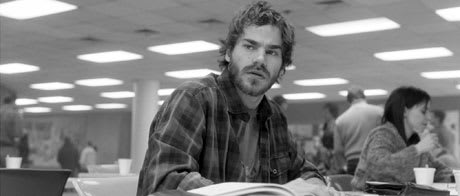To face blind hatred head on is a terrifying, confounding and anxiety-inducing experience that's difficult to describe fully. In addition to the feeling of isolation and desperation that this lack of humanity generates, there is a heightened level of despondency in the sheer lack of reason and accountability in the perpetrator's inability to individualize and interpret the victim outside of categorization.
Without psychologising, exploiting or offering tidy explanations, director Denis Villeneuve presents a contemplative and sensitive tribute to the murders that occurred on December 6, 1989, at Montreal's Ecole Polytechnique, the engineering branch of the University of Montreal. Filmed entirely in black and white, in both English and French, on separate occasions, with the same actors, the film offers only the suicide note of misogynist shooter Marc Lepine (Maxim Gaudette) and fictionalizes the victims, so as not to tarnish or reduce anyone that was tragically lost.
Rather than constructing any unnecessarily contrived narratives, Villeneuve smartly presents Valerie (Karine Vanasse), Jean-Francois (Sebastien Huberdeau) and Stephanie (Evelyne Brochu) without back-story, jumping in on the day of the event in a believable and natural manner. This further humanizes them in a relatable manner, making their experiences and struggles that much more connecting and terrifying for the casual viewer, as it is easy to inject oneself into these characters and reflect on the weight of the event.
In a truly powerful, contemplative, consternating and horrifying manner, Polytechnique manages to create the ghastly dread of the event and a devastating framework of rumination on the importance of living in the face of such monstrosity. It manages this by depicting the events in a realistic, but not gratuitous, way while focusing energies on moments of stillness and reflection, as the characters are left alone to wonder what will become of them. A sparseness in dialogue intensifies these sensations, allowing the viewer to ponder.
This film is gripping and highly significant, deserving of praise and of viewing regardless of how difficult the experience of doing so might be. Surely some may scoff at the act of committing such an event to celluloid, however, the act of watching the film, which is truly something unto itself, answers any questions of intent and sincerity.
(Alliance)Without psychologising, exploiting or offering tidy explanations, director Denis Villeneuve presents a contemplative and sensitive tribute to the murders that occurred on December 6, 1989, at Montreal's Ecole Polytechnique, the engineering branch of the University of Montreal. Filmed entirely in black and white, in both English and French, on separate occasions, with the same actors, the film offers only the suicide note of misogynist shooter Marc Lepine (Maxim Gaudette) and fictionalizes the victims, so as not to tarnish or reduce anyone that was tragically lost.
Rather than constructing any unnecessarily contrived narratives, Villeneuve smartly presents Valerie (Karine Vanasse), Jean-Francois (Sebastien Huberdeau) and Stephanie (Evelyne Brochu) without back-story, jumping in on the day of the event in a believable and natural manner. This further humanizes them in a relatable manner, making their experiences and struggles that much more connecting and terrifying for the casual viewer, as it is easy to inject oneself into these characters and reflect on the weight of the event.
In a truly powerful, contemplative, consternating and horrifying manner, Polytechnique manages to create the ghastly dread of the event and a devastating framework of rumination on the importance of living in the face of such monstrosity. It manages this by depicting the events in a realistic, but not gratuitous, way while focusing energies on moments of stillness and reflection, as the characters are left alone to wonder what will become of them. A sparseness in dialogue intensifies these sensations, allowing the viewer to ponder.
This film is gripping and highly significant, deserving of praise and of viewing regardless of how difficult the experience of doing so might be. Surely some may scoff at the act of committing such an event to celluloid, however, the act of watching the film, which is truly something unto itself, answers any questions of intent and sincerity.
